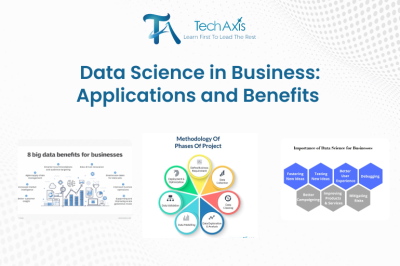
Data Science in Business: Applications and Benefits
Data science is gradually assuming centrality in Nepal's burgeoning tech landscape, and firms cannot afford to overlook it. For example, many online markets such as Daraz apply data science to make decisions about their clients' purchase behaviour and to adjust product recommendations and sales techniques. Knowledge processing focused on big data had a powerful impact on the further development of industries like banking, healthcare, and agriculture providing them with powerful tools for competitive decision-making.
Data science has its application in numerous fields, as will now see. In banking it assists in the detection of fraudsters, managing credit risk and outsourcing customer services through the use of chatbots. In that industry, it makes it possible to predict patients’ health needs and improve the working process. The agricultural industry gains from big data in approaches such as crop yield prediction and supply chain. With the help of big data, companies can perform numerous and repetitive actions, identify trends, and engage resources properly with the help of machine learning AI. The advantages are obvious—they help in decision-making to make data-driven decisions, help to discover the hidden processes that can be automated, and, last but not least, help to generate new business ideas. Therefore to support Nepalese ventures, data science must be incorporated as it ensures its competitiveness in the business environment and its longevity in the digital economy. Since more and more Nepali industries are now integrating data-driven decisions, the need for more and more skilled data scientists is anticipated to grow making it a very good career opportunity.
Applications of Data Science in Business
- Customer Analytics: Customer analytics is quite critical to the analytical part of the business as it helps define consumer behaviour and segment the market. Companies apply information and business analytics to process significant quantities of client characteristics to study buying behaviours, population distributions, and the peculiarities of customers. Through customers’ segmentation by behaviour and preferences, the firms can develop specific marketing strategies appealing to certain groups of customers. For instance, e-commerce retail firms use customer analytics to suggest subsequent purchases familiar to the customer which increases satisfaction and repeat business. Ultimately, data marketing gives value to the engagement of the business, the marketing money that is spent, and sales improvement.
- Risk Management: Risk management is not possible without data science, which helps outline the risks a business may face. Sophisticated statistical techniques enable organization fraud identification, evaluate creditworthiness, and set insurance premiums. In the financial aspect, new approaches of machine learning algorithms to analyze the patterns for existing fraud incidences as well as the anomalies in the financial data transactions to help in the prevention of fraud. In the same vein, credit risk assessments rely on data science to determine credit worthiness of a borrower by analyzing past data and thereby endorsing better lending decisions to avoid contractual default. To the business, in the insurance industry, data models assist in providing accurate pricing strategies since they evaluate risks facilitating the management of the business while offering the best price in the market.
- Supply Chain Optimization: There are so many fields which have benefited from data science and one of them is supply chain optimization. Through the employment of demand forecasting, inventory management and logistics optimization, the functioning of the supply chain gets improved and costs are reduced. This technique involves analyzing past and present customer demand and using this information to forecast customer demand for the future, helping the business to avoid running out of stock or ordering too much stock which may not sell. In the field of logistics, data science offers a means of calculating the most economical and efficient means of delivering goods and materials. Coordination in supply chain activities enables organizations to operate competitively, minimize cost, and satisfy customer needs effectively, to eliminate inefficiency.
- Product Development: The application of big data is crucial in defining product development as advanced analytics help companies in developing unique products. Marketing research helps businesses study the needs and wants of the clients, and opportunities, and create goods that will suit the market. Product testing is also done using data science since the firm can obtain user feedback when testing a product and take appropriate action to ensure that it performs to the expected level. Third, client feedback analysis fosters constant product enhancement which guarantees that companies provide solutions that solve actual challenges. The involvement of data with the process of product development enables innovation and the general quality of customer experience.
Benefits of Data Science for Businesses
- Improved Decision-Making: Business intelligence reveals various trends, and turns huge amounts of data into beneficial information that can be utilized in decision-making processes. Through the use of trends, patterns and correlation it will be possible for companies to experience a reduction of uncertainty and improvement of the decision-making process. Data science helps to make accurate predictions on market behaviour, customer behaviour, and more importantly, risk. It results in more informed decision-making processes which will positively impact growth as well as competitiveness given the dynamism of the business environment.
- Optimized Operations: This is particularly the case where the use of data science results in the efficiency of business processes and therefore development of solutions that can help to cut costs. Analyzing operational data helps to find out where there are Vietnamese, and increase productivity by minimizing costs and outsourcing repetitive activities. In specific, this optimization not only helps to reduce cost and time but also enhance the efficiency of work performance. Furthermore, there is improved resource management since data-driven models of demand forecast supply chain processes. In return, the businesses can reduce expenses, control their stocks and offer products or services more effectively to satisfy customers.
- Increased Innovation: Data science supports innovation, both identifying new sources of business opportunities and helping to develop new solutions. It helps businesses develop those products or services that may not have been familiar to the customers earlier but which they may need in the future. This leads to a competitive advantage as the companies are in a position to counteract the market changes providing their current and end consumers with unique and appropriate solutions relating to their particular needs. Data science also contributes to the creation of innovative products, navigating companies to achieve strategic market positioning, and growing businesses sustainably in a contested setting.
Data Science for Business: A TechAxis Approach
- Our Expertise: TechAxis specializes in data science training, empowering aspiring data scientists with practical skills and knowledge. Our experienced trainers are dedicated to providing hands-on learning to equip students with tools that make a real difference in today’s data-driven world. From mastering data analysis techniques to gaining insights into machine learning, TechAxis ensures that trainees are ready to meet industry demands in Nepal and beyond.
- Customized Training Programs: At TechAxis, we recognize that each learner has unique goals. Our customized training programs cater to various levels, focusing on everything from basic analytics to advanced data science techniques, tailored to fit specific Data Science learning paths. This personalized approach helps students gain relevant, actionable skills that align with their career objectives.
- Workshops and Skill-Building: Beyond traditional training, TechAxis offers specialized workshops designed to strengthen practical skills in data science. Whether you’re an organization looking to upskill your team in data analysis or an individual aiming to excel in machine learning, our workshops foster valuable, hands-on experience, preparing participants to thrive in competitive job markets.
Conclusion
Data science has become essential in today’s competitive landscape, empowering businesses with insights to drive growth, mitigate risks, and foster innovation. From personalized marketing using customer analytics to credit risk management for fraud prevention, data science enables informed decision-making, optimized operations, and the creativity to propel organizations forward.
As a leading data science training provider in Nepal, TechAxis brings proven expertise in equipping professionals with the skills to harness the power of data science. Our hands-on training sessions and workshops help teams and individuals build strong data management and analytics skills, tailored to meet the unique challenges of various industries.
Now is the ideal time to unlock data science's full potential. Whether your goals involve enhancing decision-making, improving operational efficiency, or building a data-driven culture, TechAxis is here to help you achieve them through comprehensive, industry-relevant training.
Discover how TechAxis’s training programs can elevate your team's data science capabilities. Contact us today to learn more about our customized workshops and courses designed to make a lasting impact on your organization.











